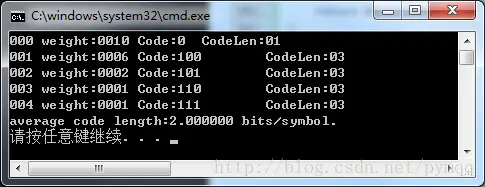基于二叉树和双向链表实现限制长度的最优Huffman编码
该代码採用二叉树结合双向链表实现了限制长度的最优Huffman编码,本文代码中的权重所有採用整数值表示。http://pan.baidu.com/s/1mgHn8lq
算法原理详见:A fast algorithm for optimal length-limited Huffman codes.pdf
演示样例:符号ABCDE的权重分别为10,6,2,1,1
不限制长度的最优Huffman编码为A:0,B:10,C:110,D:1110,E:1111,平均码长为1.8bits/symbol;
限制长度3的最优Huffman编码为 A:0,B:100,C:101,D:110,E:111, 平均码长为2.0bits/symbol;
限制长度最优Huffman编码实现代码例如以下:


算法原理详见:A fast algorithm for optimal length-limited Huffman codes.pdf
演示样例:符号ABCDE的权重分别为10,6,2,1,1
不限制长度的最优Huffman编码为A:0,B:10,C:110,D:1110,E:1111,平均码长为1.8bits/symbol;
限制长度3的最优Huffman编码为 A:0,B:100,C:101,D:110,E:111, 平均码长为2.0bits/symbol;
限制长度最优Huffman编码实现代码例如以下:
//Reference:A fast algorithm for optimal length-limited Huffman codes.pdf,http://pan.baidu.com/s/1o6E19Bs
//author:by Pan Yumin.2014-06-18
//with the method of BinaryTree and linked-list
#include <stdio.h>
#include <memory.h>
#include <malloc.h>
#define MaxSymbols 256 //the Maximum Number of Symbols
#define MaxHuffLen 16 //the Limited Length
typedef unsigned char boolean;
#ifndef FALSE //in case these macros already exist
#define FALSE 0 //values of boolean
#endif
#ifndef TRUE
#define TRUE 1
#endif
typedef struct __Node{
int width;
int weight;
int index;
int depth;
struct __Node *prev; //double linked list
struct __Node *next; //double linked list
struct __Node *left; //left child
struct __Node *right; //right child
}Node;
typedef struct __HuffTable{
unsigned int index;
unsigned int len;
unsigned int code;
}HuffTable;
//Test memory leak
/*int g_malloc = 0,g_free = 0;
void* my_malloc(int size){
g_malloc++;
return malloc(size);
}
void my_free(void *ptr){
if(ptr){
g_free++;
free(ptr);
ptr = NULL;
}
}
#define malloc my_malloc
#define free my_free*/
//Get the smallest term in the diadic expansion of X
int GetSmallestTerm(int X)
{
int N=0;
while((X & 0x01) == 0){
X >>= 1;
N++;
}
return 1<<N;
}
void deleteNode(Node *head,unsigned char *Flag,int Symbols,boolean isDelete)
{
if(head->left == NULL && head->right == NULL){
if(isDelete)
Flag[head->depth*Symbols+head->index] = 0;
else
Flag[head->depth*Symbols+head->index] = 1;
}
if(head->left){
deleteNode(head->left,Flag,Symbols,isDelete);
}
if(head->right){
deleteNode(head->right,Flag,Symbols,isDelete);
}
free(head); head = NULL;
}
//N:the Num of node
void Package_Merge(Node *head,Node **tail,int minWidth,unsigned char * Flag,int Symbols)
{
Node *tmp = NULL,*node_1 = NULL,*node_2 = NULL;
Node *node_P_head = NULL,*node_P_tail = NULL; //node_P_tail not store data,node_P_head store data
Node *node_head = head; //the head of 2*minWidth
//package
node_P_tail = (Node *)malloc(sizeof(Node));
memset(node_P_tail,0,sizeof(Node));
node_2 = node_P_tail; node_1 = (*tail)->prev;
for(;node_1 != NULL && node_1 != head; node_1=(*tail)->prev){
if(node_1->width == minWidth){
tmp = (Node*)malloc(sizeof(Node));
tmp->right = node_1->next; //insert from right to left,so the weight from small to large
tmp->left = node_1;
tmp->width = 2*minWidth;
tmp->weight = node_1->weight+node_1->next->weight;
tmp->next = node_2;
tmp->prev = NULL;
node_2->prev = tmp;
node_2 = tmp;
*tail = node_1->prev; (*tail)->next = NULL; //two intervals
}else{
break;
}
}
node_P_head = node_2;
if(*tail != head && (*tail)->width == minWidth){ //if the number of minwidth is odd,delete the max weight item of minwidth
*tail = (*tail)->prev;
deleteNode((*tail)->next,Flag,Symbols,TRUE);
(*tail)->next = NULL;
}
//find the range of 2*minWidth
node_1 = *tail;
for(;node_1 != head && node_1->width == 2*minWidth;node_1 = node_1->prev){
}
node_head = node_1; //the head of 2*minWidth, node_head not store 2*minWidth
//merge
node_1 = node_head->next; node_2 = node_P_head;
for(;node_1 != NULL && node_2 != node_P_tail;){
if(node_1->weight >= node_2->weight){
node_1 = node_1->next;
}else{ //insert to the major list
node_1->prev->next = node_2;
node_2->prev = node_1->prev;
node_1->prev = node_2;
node_2 = node_2->next;
node_2->prev->next = node_1;
node_2->prev = NULL;
}
}
if(node_1 == NULL){ //insert list 2 to the major list
(*tail)->next = node_2;
node_2->prev = *tail;
*tail = node_P_tail->prev;
(*tail)->next = NULL;
free(node_P_tail); node_P_tail = NULL;
}else{
free(node_P_tail); node_P_tail = NULL;
}
}
//N:the Num of node
int LengthLimitedHuffmanCode(Node *head,Node *tail,int X,unsigned char * Flag,int Symbols)
{
int minwidth,r;
while(X>0){
minwidth = GetSmallestTerm(X);
if( head->next == NULL) //I empty
return -1;
r = tail->width; //Just for Huffman Code,else r = GetMinWidth(head);
if(r>minwidth){
return -2;
}else if(r == minwidth){
tail = tail->prev;
deleteNode(tail->next,Flag,Symbols,FALSE);
tail->next = NULL;
X = X-minwidth;
}else{
Package_Merge(head,&tail,r,Flag,Symbols);
}
}
return 0;
}
void PrintHuffCode(HuffTable Huffcode)
{
int i;
for(i=Huffcode.len-1;i>=0;i--){
printf("%d",(Huffcode.code>>i) & 0x01);
}
}
void GenerateHuffmanCode(HuffTable *HuffCode,unsigned char *Flag,int L,int Symbols,int *SortIndex)
{
char Code[17];
int Pre_L = 0;
int i=0,j=0;
unsigned int codes[MaxHuffLen+2]={0},rank[MaxHuffLen+1] = {0}; //rank: the number of symbols in every length
//find the first code
for(i=0;i<Symbols;i++){
for(j=0;j<L;j++){
HuffCode[i].len += Flag[j*Symbols+i];
}
if(HuffCode[i].len != 0)
rank[HuffCode[i].len]++;
HuffCode[i].index = SortIndex[i];
}
for(i=0;i<=L;i++){
codes[i+1] = (codes[i]+rank[i])<<1;
rank[i] = 0;
}
//code
for(i=0;i<Symbols;i++){
HuffCode[i].code = codes[HuffCode[i].len] + rank[HuffCode[i].len]++;
}
}
float BitsPerSymbol(HuffTable *HuffCode,int *weight,int Symbols,int WeightSum)
{
float bitspersymbol = 0.0;
int i;
for(i=0;i<Symbols;i++){
bitspersymbol += (float)HuffCode[i].len*weight[i];
}
return bitspersymbol/WeightSum;
}
void FreqSort(int *Freq,int *SortIndex,int Symbols)
{
int i,j,tmp;
for(i=0;i<Symbols;i++){
for(j=i+1;j<Symbols;j++){
if(Freq[i]<Freq[j]){
tmp = Freq[i];
Freq[i] = Freq[j];
Freq[j] = tmp;
tmp = SortIndex[i];
SortIndex[i] = SortIndex[j];
SortIndex[j] = tmp;
}
}
}
}
int GenLenLimitedOptHuffCode(int *Freq,int Symbols)
{
int i,j;
unsigned char *Flag = NULL; //record the state of the node
unsigned int rank[MaxHuffLen];
Node *node = NULL,*head = NULL,*tail = NULL,*tmp = NULL; //head not store data,just a head,tail store data
int Ret = 0;
HuffTable HuffCode[MaxSymbols];
float bitspersymbols = 0.0;
int WeightSum = 0;
int SortIndex[MaxSymbols];
if(Symbols > (1<<MaxHuffLen)){
printf("Symbols > (1<<MaxHuffLen)
");
return -1;
}
for(i=0;i<MaxSymbols;i++){
SortIndex[i] = i;
}
FreqSort(Freq,SortIndex,Symbols); //sort
for(i=0;i<Symbols;i++){
WeightSum += Freq[i];
}
head = (Node*)malloc(sizeof(Node));
memset(head,0,sizeof(Node));
Flag = (unsigned char*)malloc(MaxHuffLen*Symbols*sizeof(unsigned char));
memset(Flag,1,MaxHuffLen*Symbols*sizeof(unsigned char));
memset(HuffCode,0,sizeof(HuffCode));
node = head;
for(i=0;i<MaxHuffLen;i++){
for(j=0;j<Symbols;j++){
tmp = (Node*)malloc(sizeof(Node));
tmp->prev = node; tmp->next = NULL;
tmp->left = NULL; tmp->right = NULL;
tmp->width = 1<<(MaxHuffLen-i-1);
tmp->weight = Freq[j];
tmp->index = j; tmp->depth = i;
node->next = tmp;
node = tmp;
}
}
tail = node; //tail
Ret = LengthLimitedHuffmanCode(head,tail,(Symbols-1)<<MaxHuffLen,Flag,Symbols);
GenerateHuffmanCode(HuffCode,Flag,MaxHuffLen,Symbols,SortIndex);
//print HuffCode
for(i=0;i<Symbols;i++){
printf("%03d weight:%04d Code:",HuffCode[i].index,Freq[i]);
PrintHuffCode(HuffCode[i]);
printf(" CodeLen:%02d",HuffCode[i].len);
printf("
");
}
bitspersymbols = BitsPerSymbol(HuffCode,Freq,Symbols,WeightSum);
printf("average code length:%f bits/symbol.
",bitspersymbols);
free(head); head = NULL;
free(Flag); Flag = NULL;
return Ret;
}
#include <time.h>
int main()
{
//int Freq[MaxSymbols] = {1,25,3,4,9,6,4,6,26,15,234,4578}; //weight is not zero.
int Freq[MaxSymbols] = {10,6,2,1,1}; //weight is not zero.
GenLenLimitedOptHuffCode(Freq,5);
return 0;
}
执行上述程序输出结果例如以下所看到的:
